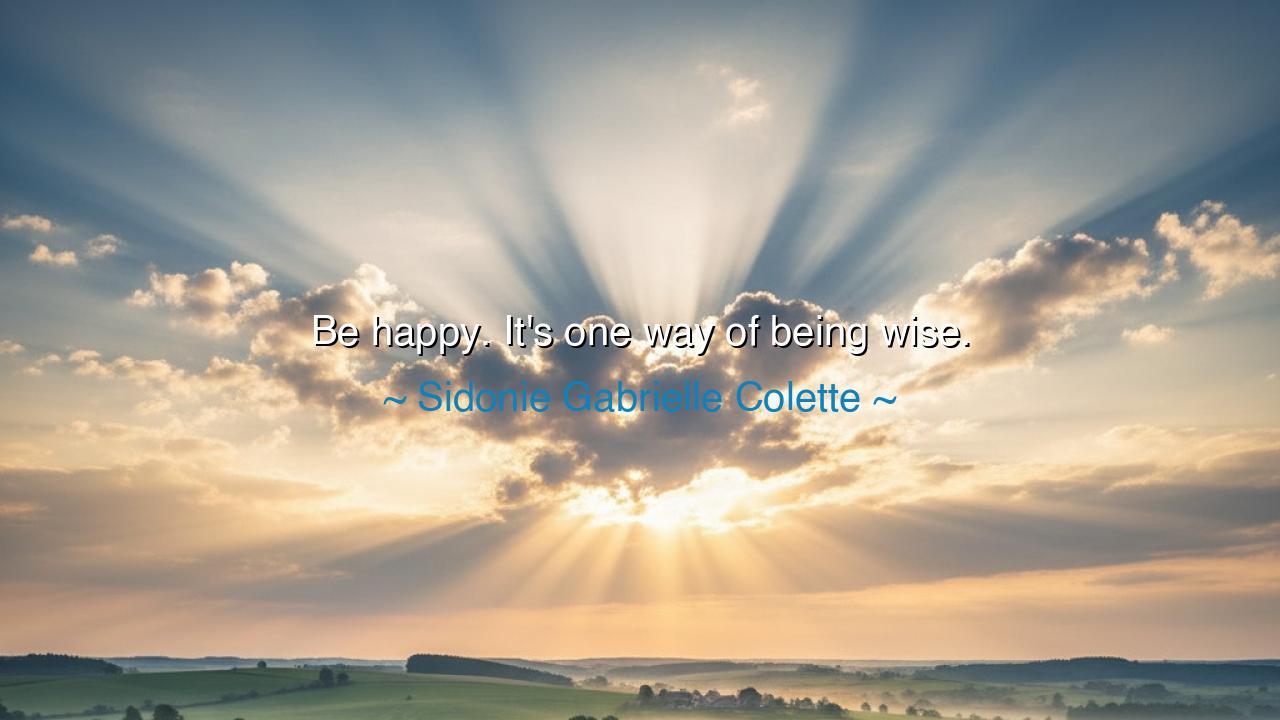
Be happy. It's one way of being wise.






"Be happy. It’s one way of being wise." Thus spoke Sidonie Gabrielle Colette, the French writer whose words carry the fragrance of joy and the weight of truth. Her teaching is simple, yet profound: that happiness is not mere indulgence or accident, but a discipline of the spirit, a deliberate act of wisdom. To choose joy in the midst of life’s storms is to master what many fail to conquer—the restlessness of the heart.
The ancients knew this path well. The Stoics taught that the wise man does not depend on fortune, but finds within himself a harmony that cannot be broken. To be happy despite hunger, exile, or even death was to triumph over the world. Epicurus, too, declared that the highest pleasure is not luxury but contentment with little. Thus, the choice of joy was itself a mark of wisdom, for it freed man from the tyranny of circumstance.
Consider the life of Anne Frank. In the midst of war, confined to a hidden room, deprived of freedom, she still found reason to write, to dream, to smile at the beauty of life. "I don’t think of all the misery, but of the beauty that still remains," she once wrote. In her happiness, however fragile, there shone a wisdom that has touched generations. She proved that joy can be a light even in the darkest cell.
So too in the life of Abraham Lincoln. Beset by war, grief, and inner sorrow, he often leaned on humor and small moments of cheerfulness. This was not frivolity, but a choice of wisdom—to guard his heart from despair and to sustain his strength for the burdens of leadership. His ability to be happy in small things gave him the resilience to guide a fractured nation.
Therefore, let this wisdom endure: to be happy is not to ignore sorrow, but to rise above it. Joy is not foolishness, but the crown of a heart that has learned balance, humility, and gratitude. Colette’s words call us to remember that in choosing happiness, we are not only comforting the soul—we are practicing wisdom, and building a fortress of light that no shadow can overcome.






BNBinh Nguyen
There’s a philosophical tension I want help resolving. If gladness is wise, is it an end state or a byproduct of living well? Stoic-style contentment comes from aligning actions with values; hedonic spikes come from novelty. How do we steer toward the first without rejecting the second? I’d appreciate a compass with three needles: virtue (did I act congruently?), connection (did I strengthen a bond?), and wonder (did I notice beauty?). If those are satisfied, the resulting lightness feels like wisdom earned, not demanded.
PA01 - Tieu Ngoc Phuong Anh
I want a concrete playbook for choosing gladness when circumstances are average, not ideal. Could you outline a 14-day experiment that treats happiness like a skill? Day themes might rotate: savoring, generosity, movement, nature, mastery, connection, play, and rest, with a nightly two-question log—“What lifted my spirit? Did it sharpen or dull my judgment?” Add a course-correction day for constraints (sick kid, deadline crush) where the task is scaling down, not quitting. If the net effect is clearer thinking and kinder choices, I’ll keep the practices; if not, I’ll prune ruthlessly.
GDGold D.dragon
Part of me worries about weaponized joy. If we equate serenity with wisdom, do we unintentionally shame grief, anger, or anxiety—emotions that sometimes signal real injustice? I’d love a both/and stance: cultivate contentment as a resource, yet keep space for protesting what hurts. What’s a practical boundary line? Maybe: use mood practices to steady attention, not to bypass conversations that are uncomfortable. Are there prompts that check for avoidance—e.g., “Am I calling this acceptance because it’s wise, or because conflict scares me?”
MTNGUYEN MINH TRI
As a reader, I’m drawn to the claim that cheerfulness isn’t frivolous—it’s strategic. When I’m in a good mood, I notice options, forgive small slights, and negotiate better. If happiness widens cognitive bandwidth, then it’s not just self-care; it’s judgment hygiene. Could you suggest a tiny daily stack that boosts baseline mood without turning life into optimization theater? I’m thinking: sunlight check, two-minute gratitude jot, one generous act, and a “don’t rush” rule for the first decision of the day. How do I measure whether this actually improves choices rather than just vibes?